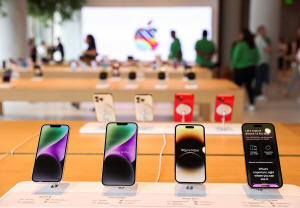Apple warns India's EU-style charger rules will hit local production
target
 Send a link to a friend
Send a link to a friend
 [December 05, 2023] By
Aditya Kalra and Munsif Vengattil [December 05, 2023] By
Aditya Kalra and Munsif Vengattil
NEW DELHI (Reuters) - Apple has told India its local production targets
will be hit if New Delhi follows the European Union and requires
existing iPhones to have universal charging ports, a government document
shows as the U.S. tech giant lobbies for an exemption or delay.
India wants to implement a European Union rule that will require
smartphones to have a universal USB-C charging port, and has been in
talks with manufacturers about introducing the requirement in India by
June 2025, six months after the deadline in the EU. While all
manufacturers including Samsung have agreed to India's plan, Apple is
pushing back.
Apple has for years offered a unique lightning connector port on its
iPhones. The EU, however, estimates a single charger solution would save
about $271 million for consumers, and India has said the move will
reduce e-waste and help users.
In a closed-door Nov. 28 meeting chaired by India's IT ministry, Apple
asked officials to exempt existing iPhone models from the rules, warning
it will otherwise struggle to meet production targets set under India's
production-linked incentive (PLI) scheme, according to the meeting
minutes seen by Reuters.
PLI is a key project of Prime Minister Narendra Modi and offers
electronic manufacturers in India fiscal incentives for fresh
investments and incremental phone sales each year. It has been
extensively used by Apple suppliers like Foxconn to expand iPhone
manufacturing in the country.

"If the regulation is implemented on earlier models of mobile phones,
they (Apple) will not be able to meet the PLI targets," the minutes
quoted Apple's regulatory and product compliance executives as saying
while opposing the rules.
Apple did not quantify the production impact in the meeting, and the IT
ministry decided to review its request and reach a decision later, two
people familiar with the discussions said.
Apple, whose India lobbying efforts are being reported for the first
time, and India's IT ministry, did not respond to Reuters requests for
comment.
[to top of second column] |

Apple iPhones are seen inside India's first Apple retail store
during a media preview, a day ahead of its launch in Mumbai, India,
April 17, 2023. REUTERS/Francis Mascarenhas

DESIGN CAN'T CHANGE
India is seen as Apple's next growth frontier after China.
Renowned Apple analyst Ming-Chi Kuo has estimated 12-14% of iPhone
production in 2023 will be from India, with the number set to rise
to as much as 25% next year.
In terms of market share, Apple accounts for 6% of India's booming
smartphone market, compared with just about 2% four years ago. Apple
suppliers have expanded their facilities and make most iPhone 12,
13, 14 and 15 models in India for local sales and exports,
Counterpoint Research estimates.
Only iPhone 15 has the new universal charging port. Apple told
Indian officials in the meeting that the "design of the earlier
products cannot be changed," the document showed.
Consumers in India's price-conscious market prefer buying older
models of iPhones which typically become cheaper with new launches,
and India's push for the common charger on older models could hit
Apple's targets, said Prabhu Ram, head of the Industry Intelligence
Group at CyberMedia Research.
"Apple's fortunes in India have primarily been tied to older
generation iPhones," he said.
The EU's charging port rules kick in in December 2024, and India
wants compliance by June 2025.
Apple told officials it can comply with that timeline if existing
models are exempted from the rules, but will need 18 months beyond
2024 if they are not.
"A natural transition period should be given ... keeping in mind the
product design timelines," the minutes quoted Apple executives as
telling government officials.
(Reporting by Aditya Kalra and Munsif Vengattil; Editing by Susan
Fenton)
[© 2023 Thomson Reuters. All rights
reserved.]
This material may not be published,
broadcast, rewritten or redistributed.
Thompson Reuters is solely responsible for this content. |